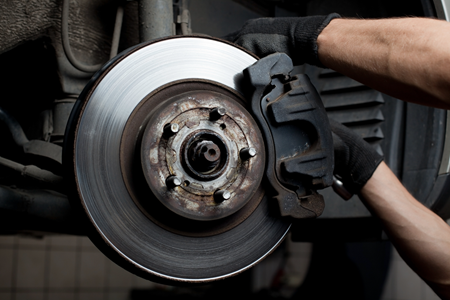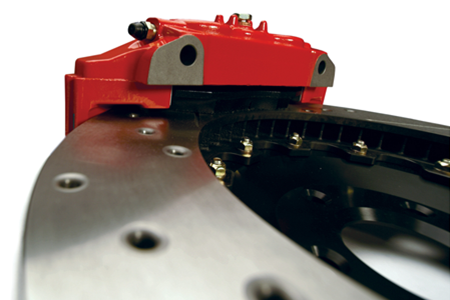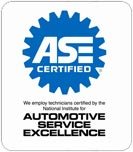Whether you just had a brake job or not, here is the noise about brake squeaking:
Today’s complex European-engineered vehicles all make use of advanced braking and have one thing in common—they all stop great when the brakes are operating properly. Whether you drive a Mercedes Benz, BMW, Porsche, Audi, Volkswagen, Mini, Jaguar or Land Rover, the condition of your vehicle’s brakes is critical. Unlike most domestic and other brands, the performance brake system in your Mercedes Benz, BMW, Porsche, Audi, Volkswagen, Mini, Jaguar or Land Rover utilizes extremely soft compounds to enhance brake stopping power. It is this softer compound that allows the brake pads to grab and actually stick to the brake rotors, increasing stopping power. On the positive, this increases the gripping power of the brake pads to the rotors. On the down side, you have an increased amount of brake dust as a by-product.
A brake pad design not specific to the OEM specification may not only provide poor stopping power, but may lead to brake squeal and excessive noise. Brake noise is common and can be caused by a number of driver conditions and wear factors including excessively worn brake pads or brake rotors, glazed brake pads or rotors, broken or damaged anti-rattle clips or a lower quality pad that does not incorporate a backing shim.
Worn brake pads:
The brake pad (set) is the friction material that makes contact with the brake rotor to stop the vehicle.  The brake rotor spins with the wheel while the brake pad remains fixed to the chassis of the vehicle. Hence when you hit the brakes on your Mercedes Benz, BMW, Porsche, Audi, Volkswagen, Mini, Jaguar or Land Rover, the pads are pressed against the brake rotor and the friction is what slows and stops the vehicle. By design, the brake pad and rotor wear together. Most of these pads incorporate sensors to advise the driver when the pad material is too thin to be effective and must be replaced. Again, it is this friction and the wear of the pad material and rotor that causes the brake dust that you see on your wheels. As the pad and rotor wears, imperfections in the mating surface are created by allowing air to “whistle” or “squeal” when applying the brakes.
The brake rotor spins with the wheel while the brake pad remains fixed to the chassis of the vehicle. Hence when you hit the brakes on your Mercedes Benz, BMW, Porsche, Audi, Volkswagen, Mini, Jaguar or Land Rover, the pads are pressed against the brake rotor and the friction is what slows and stops the vehicle. By design, the brake pad and rotor wear together. Most of these pads incorporate sensors to advise the driver when the pad material is too thin to be effective and must be replaced. Again, it is this friction and the wear of the pad material and rotor that causes the brake dust that you see on your wheels. As the pad and rotor wears, imperfections in the mating surface are created by allowing air to “whistle” or “squeal” when applying the brakes.
Glazed brake pads and rotors:
Brakes are designed to be used and as such designed so that when applied the griping or friction surface of the pad and the mating surface of the brake rotor wear together and evenly. When brakes “drag” either by a driver resting a foot on the brake pedal or a brake caliper sticking allowing the brake pad to remain in slight contact with the brake rotor, this creates excessive friction and heat. This excessive heat causes a glaze to occur on the surface of the brake rotor and brake pad. This glaze comes from the hardening of the friction material which actually crystallizes. This crystallization process is what causes the “squeal.” This condition may often be rectified by several firm applications of the brakes. Alternatively, the pads and rotors may be sanded to break the glaze surface.
Broken anti-rattle clips:
Anti-rattle clips are designed to hold the brake pads firmly within the brake caliper. A broken clip will allow the brake pad to “chatter” allowing air to pass through, making the familiar squeaking noise. The only remedy in this case is to have the clips replaced on your Mercedes Benz, BMW, Porsche, Audi, Volkswagen, Mini, Jaguar or Land Rover.
Brake Pad insulation or shims:
As previously discussed, your Mercedes Benz, BMW, Porsche, Audi, Volkswagen, Mini, Jaguar or Land Rover quality brake pads incorporate an insulating shim on the back side of the brake pads. These shims prevent brake squeal. Lower quality brake pads do not come with these shims and new shims must be installed. Furthermore, these shims do wear and must be replaced when they become worn.
Turning brake rotors:
The brake rotors on your Mercedes Benz, BMW, Porsche, Audi,  Volkswagen, Mini, Jaguar or Land Rover cannot be turned. The process of turning a rotor is to place it on a brake lathe and cut the friction surfaces. This process makes the brake surface thinner. The brake rotors on your European vehicle come from the factory at a minimum thickness and can not be safely turned.
Volkswagen, Mini, Jaguar or Land Rover cannot be turned. The process of turning a rotor is to place it on a brake lathe and cut the friction surfaces. This process makes the brake surface thinner. The brake rotors on your European vehicle come from the factory at a minimum thickness and can not be safely turned.
Proper maintenance and repair is needed whether you drive a Mercedes Benz, BMW, Porsche, Audi, Volkswagen, Mini, Jaguar, Land Rover or other European vehicle and service experts at DreamCars Auto Repair are equipped to handle your needs. If you have any questions, simply contact us any time by phone or email or visit us in person and we will be happy to assist you!











